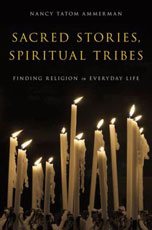Nancy Ammerman is Professor of Sociology of Religion at Boston University, where she teaches in the College of Arts and Sciences and the School of Theology. As we have seen this year, the term "Spiritual But Not Religious" still has plenty of energy along with the potential to stir people up. The author of this book gathered personal stories about their beliefs and practices from 95 men and women from Boston and Atlanta. They were a mix of Catholics, conservative and liberal white Protestants, African-American Protestants, Jews, Mormons, neo-pagans, and those who describe themselves as unaffiliated. From their stories, Ammerman and her colleagues have discerned the meaning of spirituality in the religious narratives these people told about their everyday lives.
The researchers organized ways of talking about spirituality into four groups:
1. Theistic
2. Extra-Theistic
3. Ethical
4. Belief and Belonging.
Individuals also talked about God, morality, study and prayer, mystery, meaning, connections to others, and awe. One of the most interesting chapters for us was the one in which people gave accounts of their spirituality in their everyday lives such as praying through the day, studying Scripture, and sacralizing all kinds of ordinary activities such as cooking a meal, keeping a journal, walking the dog, or doing physical exercises.
Ammerman also discusses spiritual activities at work, in the public sphere, and in health, illness, and mortality. In the end, the author contends that committed religious believers and those who only call themselves spiritual have a lot more in common than has been thought. Both groups are interested in sacred consciousness and in the creation of new places and imaginal spaces where they can do the spiritual practices that give meaning to their lives.
